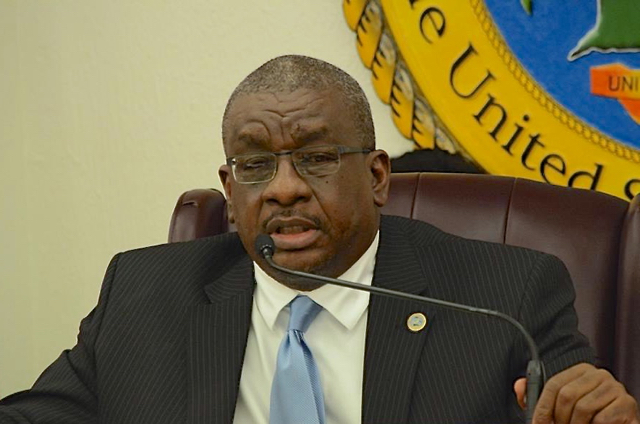
The tax credit bill, sponsored by Sen. Clifford Graham, would repeal and replace a law enacted in 2011 to give large tax breaks to encourage video and film production. (See Related Links below) As proposed, it was nearly identical to a bill Gov. John deJongh Jr. vetoed in January just before leaving office.
In his letter to the Legislature explaining his veto of the first version of the bill in January, deJongh said the legislation "seems to have sacrificed our local music and audio production industry in an attempt to appeal to the worldwide film industry."
DeJongh also objected to the fact that the bill created "an entirely separate department within the Economic Development Authority … without providing the necessary funding to support its operation."
During committee hearings, Graham offered a replacement bill addressing some of the concerns. The new version keeps in place existing breaks for audio and music production and adds new tax credits for film, while the original bill repealed the entire existing set of tax breaks and replaced them with only the new film and video production ones.
Graham’s bill gives tax credits of 10 to 17 percent of the wages and salaries of Virgin Islands residents employed on the project, which the company can then sell to any other V.I. taxpaying business, if they owe less than the credit.
It also would give a break on the territory’s hotel occupancy tax, based on the number of rooms booked and for how many nights. The bill would create a new division within the Economic Development Authority to handle the film and video industry. And it would give cash "rebates" based on the amount of spending in the territory.
Several private attorneys and officials with companies that provide services to video production companies testified in favor of the bill, saying most states recently began offering incentives and that the territory will miss out if it does not follow suit.
Before passing the bill, senators amended it Wednesday to require the V.I. Bureau of Economic Research to analyze and report on its impact to the V.I. Treasury annually.
The Legislature also approved a bill requested by Mapp to set aside $1 million from any available funds to pay outside legal specialists to help sue Hovensa for the $40 million the refinery is not paying on a court settlement and for back taxes.
In January, Gov. Kenneth Mapp announced the administration would take Hovensa and its parent companies to court to get $40 million owed the territory from a recent environmental settlement as well as some property and other taxes.
The settlement is Hovensa’s share of cleanup costs of a leak the refinery reported back in 1982 and has been cleaning up ever since. The USVI government eventually settled the suit for $43.5 million, with $3.5 million received at the settlement signing and the remaining $40 million coming after the sale of the refinery or by Dec. 31, 2014 – whichever came first.
Instead, the refinery did not sell and Hovensa announced it plans to use the $40 million to close and mothball the facility and has no intention of complying with its settlement.
The government issued a breach of settlement notice to Hess and PDVSA and began legal foreclosure proceedings on the refinery. The underlying land belongs to the government already.
While the territory is suing Hovensa, Hovensa’s parent companies are both suing the territory for $237 million they claims they are owed in back taxes.
Hovensa’s owners claim large losses in 2008. But the V.I. Internal Revenue Bureau says Hovensa underpaid 2008 taxes, disallowing a number of large deductions focused on a small number of executives paid multimillion-dollar salaries. Hovensa’s parent companies dispute the legal basis and timeliness of IRB’s actions, saying, in part, that the statute of limitations expired on adjustments on 2008 returns before IRB rejected the deductions. (See Related Links below)
The Legislature also approved a bill slightly changing the membership of some of its committees. And it approved a bill setting the Legislature’s budget so that its budget cycle coincides with the calendar year. Senators said the purpose was so senators did not vote on budgets that affected subsequent Legislatures. Senators terms begin and end in January.
It also approved two St. Thomas zoning requests: a use variance to the R-1 (residential- low density) zoned Parcel No. 9M-1 Estate Nazareth No. 1 Red Hook Quarter, St. Thomas, to allow a bed and breakfast. And to change the zoning of parcels: Consolidated A-1-A, A3B-1 and A1-B Estate Lovelund, No. 2 Great Northside Quarter, St. Thomas from R-3 (residential-medium density) to B-3 (business-scattered).
All legislation approved in session will be sent to Gov. Kenneth Mapp for his signature or veto.
The session continues Thursday morning.


